PROGRAM SCHEDULE 2008-2009
22nd Season
| Sun | Sep | 21 | 2:00 | TSO goes to Carnegie Hall
Shostakovich's Symphony No. 11 & Ute Lemper

For the first time in ten years the Toronto Symphony Orchestra will perform in Carnegie Hall in New York City on October 4. The music director Peter Oundjian has made a challenging, provocative selection for the program of this return visit, focusing on the tragedies of the 20th century. 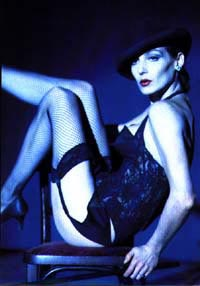 Ute Lemper will appear as a soloist and from her signature Kurt Weil repertoire will sing The Seven Deadly Sins. The second part of the concert will be Shostakovitch's massive Symphony No. 11, Op. 103 “The Year 1905”, with which Peter Oundjian had remarkable success with the TSO in February 2006. Ute Lemper will appear as a soloist and from her signature Kurt Weil repertoire will sing The Seven Deadly Sins. The second part of the concert will be Shostakovitch's massive Symphony No. 11, Op. 103 “The Year 1905”, with which Peter Oundjian had remarkable success with the TSO in February 2006.  People still comment regarding this striking and exciting performance. Toronto audiences will have a preview of the Carnegie Hall concert on October 1 & 2 at Roy Thomson Hall, and CMC members will have an even earlier sneak audio preview at our first program of the 2008/09 season.
Ute Lemper's unique artistry will also be investigated. People still comment regarding this striking and exciting performance. Toronto audiences will have a preview of the Carnegie Hall concert on October 1 & 2 at Roy Thomson Hall, and CMC members will have an even earlier sneak audio preview at our first program of the 2008/09 season.
Ute Lemper's unique artistry will also be investigated.
(ta/js&ta)
|
| Sun | Oct | 5 | 2:00 | Prokofiev: War and Peace
Please note the extended duration, for the massive opera will be presented without cuts.
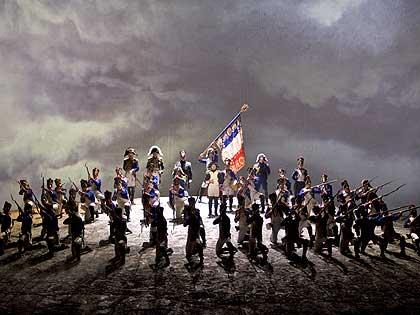
Toronto’s music lovers should be proud of the Canadian premiere of War and Peace, a masterpiece of the 20th century and a truly magnificent piece of art based on historical events and Tolstoy’s monumental novel. The scale of the piece is almost beyond belief: the sheer number of scenes, characters, costumes, and instruments, etc. The diversity of the tale begins with the passion of youth energized through sleepless nights in the countryside, intimate parties with conversations delicately flowing through the Russian aristocratic society of St. Petersburg, and reaches the broad scenes of the battlefield with the monstrous Napoleon, the invader himself.

In spite of the complexity of the variety of events, the musical impression is in the end heightened to eternal statement of love and patriotism. Moving indeed!
(ta/bs)
Canadian Opera Company presents Prokofiev: War and Peace, at the Four Seasons Centre for the Performing Arts, 145 Queen St. W., Toronto
Oct. 10, 14, 16, 22, 29 and Nov. 1, 2008 at 7 p.m.
Oct. 25 at 4:30 p.m. and Oct. 19 at 2 p.m.
Conducted by Johannes Debus / J. David Jackson (Nov. 1), directed by Tim Albery
The role of Andrei Bolkonsky will be sung by Russell Braun
Box Office: 416-363-8231, tickets $290, $235, $195, $160, $130, $95, $60
|
| Sun | Nov | 23 | 2:00 | Faust (Part 1)
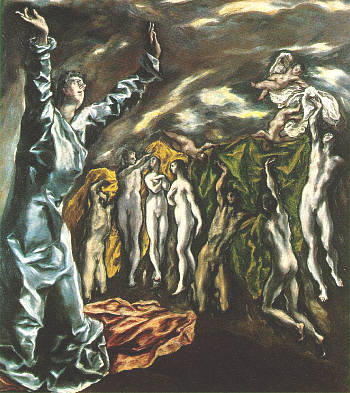
The Faust legend about the pact with the devil has been the source of many literary works, the most popular being Goethe’s Faust, which, in turn, became the inspiration of many musical works. Yet another literary incarnation of the Faust legend, equally important and profound as Goethe’s work (though less known) is Thomas Mann’s Doktor Faustus. Written during World War II, it is the life story of the fictitious composer Adrian Leverkühn, who makes a pact with the devil for 24 years of genius and composing of amazing musical masterpieces, in exchange for Leverkühn renouncing human warmth and love. The novel has two main themes: one is the notion that enhanced artistic sensitivity and creativity is, in essence, morbid; the other is the parallel between Leverkühn’s physical and mental decay, and the change from humanism to irrational nihilism in Germany’s intellectual life leading to the horrors of the Nazi era, thus making aestheticism the herald of barbarism.
Doktor Faustus has not inspired any musical works. However, since it is the story of a composer, the novel is replete with musical references. I will present some of the many musical pieces, either explicitly named and described, or only alluded to in this literary work.
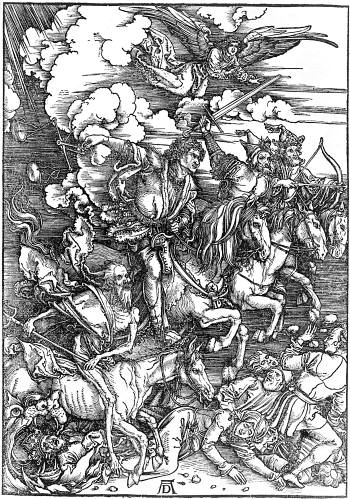
(jn/js&ta)
|
| Fri | Dec | 12 | 6:30 |  Christmas Party Christmas Party
Each year, the Classical Music Club Toronto holds a Christmas party for members and their guests. We hold the party to a FRIDAY night because Saturdays in December tend to be fully booked for many of the Classical Music Club Toronto members.
()
|
| Sun | Jan | 11 | 2:00 | Mozart: Jupiter and The Magic Flute
Mozart's last symphony and last opera.
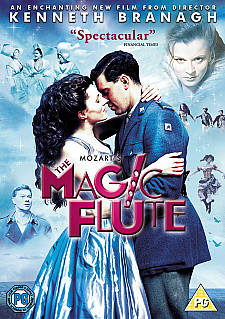 > >
At a time when popular interest in his artistry was declining Mozart composed a set of three symphonies in 1788 without any premiere performance scheduled. The last composition of the set is now known as the Jupiter Symphony, and is probably one of the most triumphant, monumental symphonic works of the classical period. One side of the piece represents the culmination of classical form and the other side the end of one era and the beginning of the next decade at the same time.
In bad health and poverty Mozart wrote The Magic Flute, his last piece for the stage, ironically receiving his last popular success. This piece also declared (as Jupiter did) the end of a certain style and predicted the next generation's possibilities in musical theatre.
The TSO presents both the Jupiter Symphony and The Magic Flute in their annual Mozart Festival this year. Let's have a internal view of these two masterpieces from the late creations of Mozart.
DVD presentations, Kenneth Branagh's film of The Magic Flute, and peformances by Riccardo Muti and Nikolaus Harnoncourt will be included.
(ta/ta&js)
|
| Sun | Feb | 1 | 2:00 |
Faust (Part 2): Berlioz: The Damnation of Faust
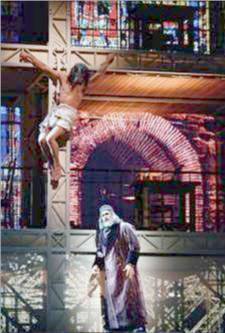
Part 2 of our examination of the Faust legend highlights Berlioz's La
damnation de Faust (The Damnation of Faust) of 1845. This large-scale work
for four soloists, chorus, and orchestra stems from Berlioz's obsession with
Goethe's Faust which he read incessantly in Gérard de Nerval's French
translation. In a translation based on Nerval's and added text by Almire
Gandonnière and Berlioz himself, we begin with Faust's discontent with life
and follow a number of separate scenes finally ending with the uplifting
redemption of Marguérite. Berlioz's highly original orchestrations paint a
canvas of ever-changing and compelling images through his original and
imaginative use of different instrumental colours and groupings. Note the
plaintive viola solo accompanying Marguérite's first aria ( “Autrefois un roi de Thulé“ (“The King of Thule“); the trombones which swiftly announce the arrival of Méphistophélès; and the massed brass and winds describing Faust's descent into Hell (Pandaemonium).
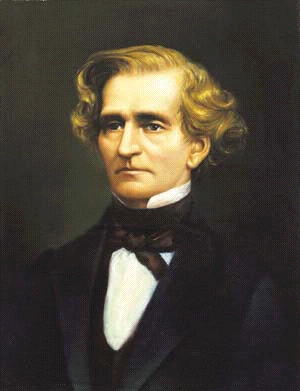
Recently, the MET presented the Robert Lepage production of Damnation in
High Definition at cinemas around the world. As well, the Toronto Symphony
Orchestra will perform the work on February 26 & 28 under the direction of
Charles Dutoit. In preparation for this rarely-performed work, the CMC
program will feature DVD selections from a visually stunning production at
the 1999 Salzburg Festival. Also, we will have a chance to sample the
artistry of several soloists and orchestras on both CD and DVD in this
dramatic and compelling work of the early Romantic period.
(ta/bs)
|
| Sun | Mar | 15 | 2:00 |
Yannick Nézet-Séguin, Conductor
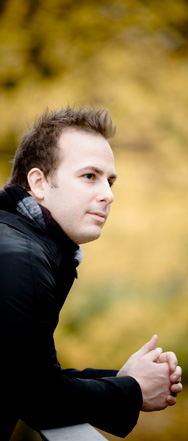
Canadian conductor Yannick Nézet-Séguin must be one of the busiest orchestra leaders in the business these days. In addition to continuing to guide the Orchestre Métropolitain du Grand Montréal (which he has helmed since 2000), he was named the 11th Principal Conductor of the Rotterdam Philharmonic Orchestra beginning with the 2008-2009 concert season. Also beginning this season, the London Philharmonic Orchestra named him as their new principal guest conductor.
Maestro Nézet-Séguin is no stranger to Toronto audiences having conducted the orchestra in Gounod’s Faust with the Canadian Opera Company as well as several appearances with the Toronto Symphony Orchestra. He returns to Toronto on March 25, 26, and 28 to lead the TSO in performances of Ravel’s two piano concertos (with Louis Lortie) and the Alborada del gracioso. The concerts will also feature the Fifth Symphony of Prokofiev.
Our program will feature selections from Maestro Nézet-Séguin's extensive discography on the ATMA label as well as recordings by two conductors he considers to be his greatest inspirations: Charles Dutoit and Carl Maria Giulini.
(ta/ta&js)
|
| Sun | Apr | 5 | 2:00 | Bruckner's Symphony No. 8
Anton Bruckner’s massive Eighth Symphony in C minor (sometimes called “The Apocalyptic”) is the last completed, monumental work in the symphonic genre by the so-called “minstrel of God”. It is also one of the highest achievements of the entire symphonic literature.
In this work the composer recalls the struggle that must occur for the artist to accomplish his essential mission: the revelation of Divine Truth. To build his “cathedral of sound”, Bruckner calls on impressive orchestral forces including the famous Wagner tubas.
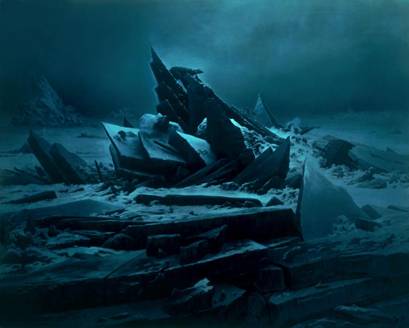
Great conductors such as Herbert von Karajan, Eugen Jochum, Sergiu Celibidache, Günter Wand, and Karl Böhm have always been drawn to this symphonic masterpiece. Although the limitations imposed by early recording technology meant that the Eighth Symphony first appeared only in excerpts — the slow movement in 1924 under Otto Klemperer — from our vantage point in the early 21st century, we now have the opportunity to sample some of the great recordings by the greatest Bruckner conductors of the past eight decades.
The Toronto Symphony Orchestra performs Bruckner”s Eighth Symphony under Music Director Peter Oundjian on Wed., Apr. 29 and Thurs., Apr. 30 in Roy Thomson Hall at 8 pm. For further information, please visit www.tso.ca.
(js/ta&js)
|
| Sun | May | 17 | 2:00 | Haydn: The Creation
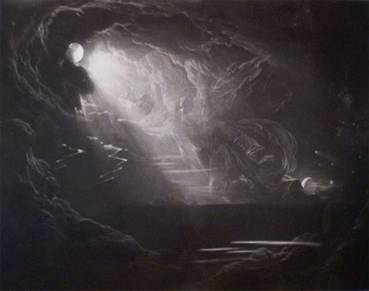
Immediately after the official premiere of Haydn's Creation on March 19, 1799, a sensitive listener wrote the following in a letter to his cousin:
“I would never have believed in my life that human lungs and catgut could have produced such wonders. The very music gave out thunder and lightening, and the birds really sang and the lion roared, and you could even hear the worms creeping along the ground. I've never come away from the theatre in such high spirits, and I even dreamed about the creation of the world all night.”
For the May 17 presentation, we will hear a performance of the entire work, but, before that, particular attention will be paid to Haydn's remarkable Introduction to Part I. David Wyn Jones takes a good stab at articulating the ineffable power of this passage:
“Part One opens with a remarkable evocation of nothingness, of the giant black holes of space that existed before the creation. With a slow-moving alternation of massive and lightweight sonorities, the orchestra deploys an allusive harmonic language that would have represented the cutting-edge of musical style had it been written 60 years later. When one visitor during its composition remarked that the music lacked perfect cadences, the composer replied: 'That's because there's no form in anything yet.' Archangel Raphael, followed by the chorus, moves the narrative towards the sublime moment of the invention of light, a colossal C major chord for full orchestra and chorus that imposes musical order on the preceding tortuous chromaticism and whispered lines. Following this musical 'big bang', the narrative moves with confidence into the orderly creation of the world.”
(bp/bp&rs)
[Discography]
|
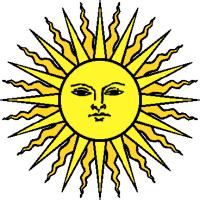 |
Hot
Summer
Videos
|
 |
|
| Sat | Jun | 13 | 7:00 | Countess Maritza
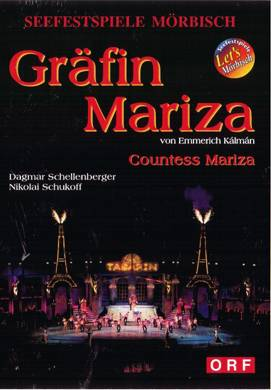
One of the world's greatest operetta festivals takes place on one of the most beautiful open-air stages in Europe in the picturesque town of Mörbisch near the impressive natural scenery of the Neusiedlersee, sixty kilometres from Vienna.
Seating an audience of more than 6,000 at each performance, the festival welcomes more over 220,000 visitors to an acoustically and visually unique event every year.
Under the direction of art director Professor Harald Serafin the festival enjoys an international reputation and has been established as a significant promoter of classical operetta.
To begin our summer season, we present a performance on DVD of Hungarian composer Emmerich Kálmán�s charming operetta, Gräfin Mariza. With a libretto by Julius Brammer and Alfred Grünwald, the work received its premiere in Vienna on February 28, 1924 at the Theater an der Wien. Under the title Countess Maritza, the operetta made its New York debut, in an English adaptation by Harry B. Smith and with interpolated music by other composers, on September 18, 1926.
(ta&js/ta&js)
|
| Sun | Jun | 28 | All day | Pride Day CMC Booth
|
| | | |
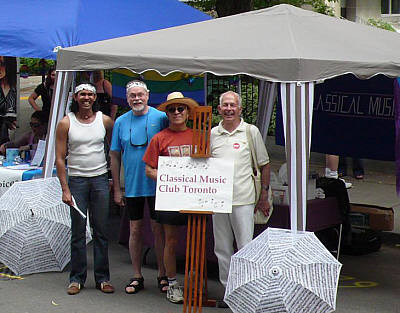
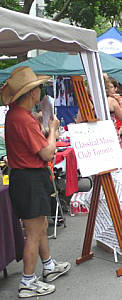

Drop by our club´s booth on Pride Day, June 28, 2009
We´re on Alexander St. with the community organisations
Club members will be there to answer your questions
And we will have some previously enjoyed CDs for sale.
Pride Toronto Official Web site
|
| Sat | Jul | 18 | 7:00 | Salome
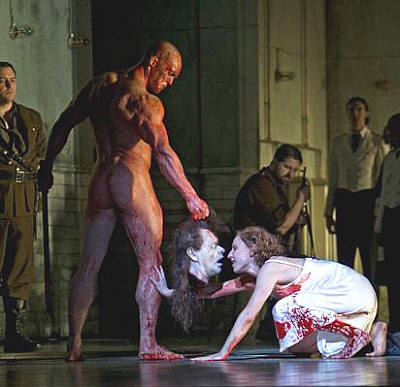
Ever since its world premiere in December 1905, Richard Strauss’ Salome has shocked and delighted audiences with its combination of biblical themes, eroticism, and murder. The opera was banned in London by the Lord Chamberlain’s office until 1907. In New York, the content was enough to frighten the financial supporters of the Metropolitan Opera to suppress future presentations after the opening night performance.
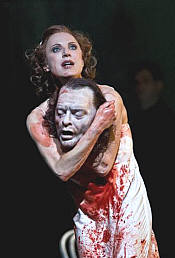 The 2008 production by David McVicar for the Royal Opera, Covent Garden, presents story in a contemporary and sordid setting. We, the audience, are spying on the depraved and sickly happenings in the palace of King Herod of Judea. Starring soprano Nadja Michael in the title role with Canadian tenor Joseph Kaiser (also seen as Tamino in Kenneth Branagh’s film of The Magic Flute), this performance is conducted by Philippe Jordan.
The 2008 production by David McVicar for the Royal Opera, Covent Garden, presents story in a contemporary and sordid setting. We, the audience, are spying on the depraved and sickly happenings in the palace of King Herod of Judea. Starring soprano Nadja Michael in the title role with Canadian tenor Joseph Kaiser (also seen as Tamino in Kenneth Branagh’s film of The Magic Flute), this performance is conducted by Philippe Jordan.
(ta/ta&js)
|
| Sat | Aug | 8 | 7:00 | The Car Man
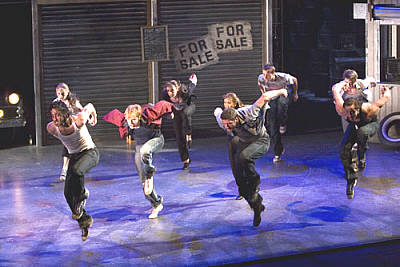
Matthew Bourne, the British choreographer/director, perhaps best known for his 1995 gender-bending production of Swan Lake, has created an update on Bizet�s familiar opera about the seductive gypsy and her lovers. Billed as an “auto-erotic thriller” on its first appearance in 2000, The Car Man takes place in and around a garage in the fictional town of Harmony, USA, where the dreams and passions of the inhabitants are shattered by the arrival of a handsome stranger. On its first appearance in 2000, the piece was billed as an “auto-erotic dance thriller [in which], fuelled by heat and desire, the inhabitants are driven into an unstoppable spiral of greed, lust, betrayal and revenge.” Bourne’s choreography is intensely physical and full of graphic sexuality, but it can be lyrically graceful as well. The musical score was created by Terry Davies from Rodion Shchedrin’s symphonic adaptation of the original Bizet opera.
“Spectacular, seething and sizzling with lust and heat!” — Evening Standard.
(/)
|
| Sat | Aug | 22 | 7:00 | B.Y.O.R.
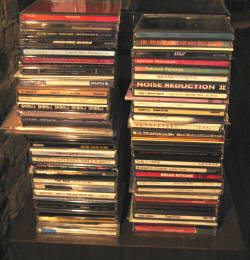
This is an opportunity for members to participate without a requirement to
plan an entire two hour program. Bring along CD or DVD selections that you
would like to share with the other club members, up to about 10-15 minutes in duration. Leaf through your collection, rediscover a dusty gem, blow the dust off
it and bring it along to the meeting.
(bc/bs)
|
|

